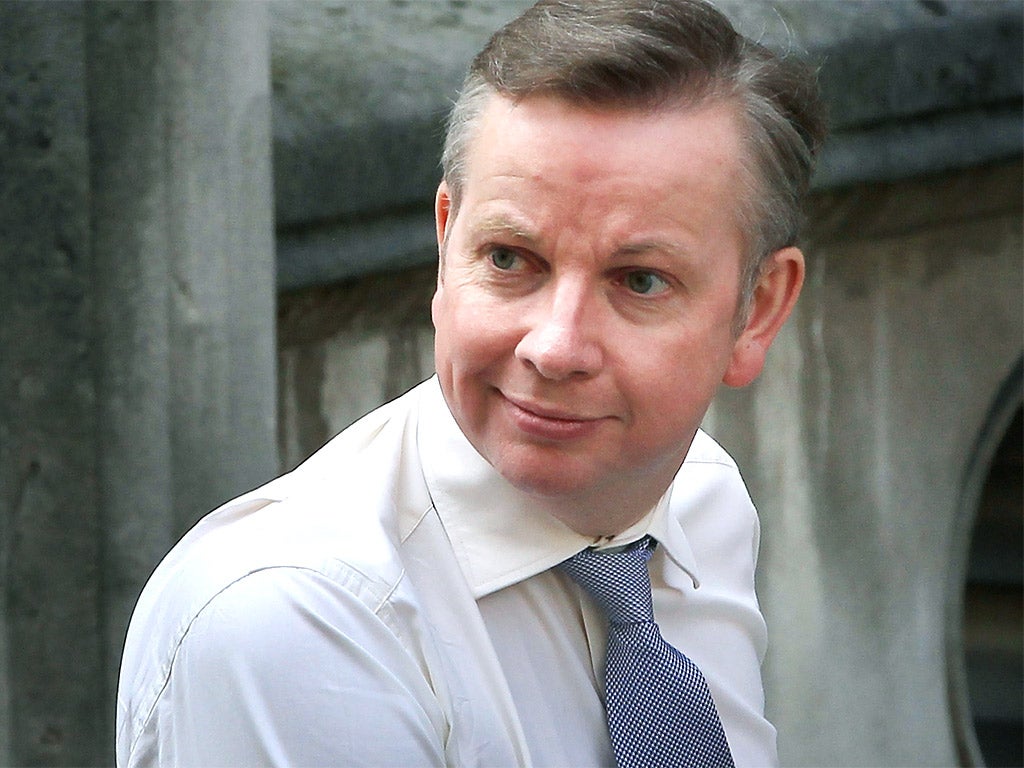Tories reveal their opposition to press regulation by law
Theresa May and Michael Gove both warn Lord Justice Leveson that any plan for statutory control would damage British society

David Cameron's Cabinet may already be on a collision course with the Leveson Inquiry even before its recommendations have been published.
With Lord Justice Leveson hinting that a "statutory" framework will be a key part of his report's recommendations when it appears later this year, the first two members of the Cabinet to give evidence to the inquiry both openly challenged the idea of any laws to control the press.
The Home Secretary, Theresa May, said legal control would "encroach on freedom" and lead to what she called "unintended consequences". She warned against "state interference" in newspapers through a statutory body, and said that although there was "growing concern" that the Press Complaints Commission was failing to do its job, press freedom was essential for democracy.
The Education Secretary Michael Gove echoed Mrs May's comments, saying he was "unashamedly on the side of those who say we should think carefully about regulation". And he said he believed "existing laws" needed to be better used, adding that "the case for regulation needs to be made very strongly before we further curtail liberty."
Mrs May's views will be crucial if the recommendations in the coming Leveson report are to be adopted in full by the Government. The Home Secretary will be part of the small team of ministers and advisers who will sit in judgement on the report's findings.
The views from the two secretaries of state are the first indication that, although Downing Street ordered the Leveson Inquiry last July during the crisis caused by the revelations surrounding the hacking of Milly Dowler's phone, that crisis has since eased politically, if not legally.
Mr Gove's testimony also included an impassioned defence of Rupert Murdoch, the Education Secretary's former employer, whom he lauded as "one of the most impressive and significant figures of the last 50 years".
The News Corporation chairman, who was dismissed as "not a fit person" to run an international company by a House of Commons select committee, was heralded by Mr Gove as a "force of nature, a phenomenon, a great man".
In her appearance, Mrs May was questioned about how worried the Government had become when it emerged last July that Milly Dowler's phone had been hacked. Political briefings notes prepared by the Home Office now make it clear that alarm bells were ringing inside the Government.
The notes showed concern that the Prime Minister's hiring of the former News of the World editor, Andy Coulson, as his communications director, would once again cause severe embarrassment. In one briefing for the Home Secretary, the advice states: "The key political question is about Coulson, surely."
Although hacking's illegality and Mr Coulson's resignation from the NOTW had been a dormant political issue since 2007, Mrs May said phone hacking only came across her "radar" in September 2010 when The New York Times published an article showing new evidence from new sources.
The US article should have raised alarm across the Conservative administration. However, Mrs May said, she had not read the piece herself. "I saw reports of it," she told the inquiry, "but I didn't read the whole piece."
* Lord Justice Leveson yesterday took the unusual step of referring the protester who burst into his public inquiry to shout at Tony Blair to the director of public prosecutions.
David Lawley-Wakelin, 49, was released without charge by police following his arrest inside the inquiry chamber. However the judge has now intervened to ask prosecutors and Scotland Yard to investigate the matter. He said they would decide "the way in which the matter can be dealt with appropriately".
Gove: Firms may profit from free schools
Michael Gove yesterday gave an indication that the Government's new free schools may be allowed to make a profit for companies which invest in them.
In his evidence to the Leveson Inquiry, Mr Gove ruled out a change before 2015 because of objections from the Liberal Democrats.
But he added that profit-making plans could come into play if the Conservatives were voted in for a second term.
The NUT's deputy general secretary Kevin Courtney said, "The NUT has been clear all along that the free schools policy was driven by the expectation of profits for those proprietors setting such schools up," he said.
In Sweden, where Mr Gove's idea originated, critics say that, while free schools began as initiatives by parents and faith groups, these groups were rapidly dwarfed by profit-making enterprises.
A number of these companies have been accused of putting profits before pupils.
Oliver Wright
Join our commenting forum
Join thought-provoking conversations, follow other Independent readers and see their replies
Comments